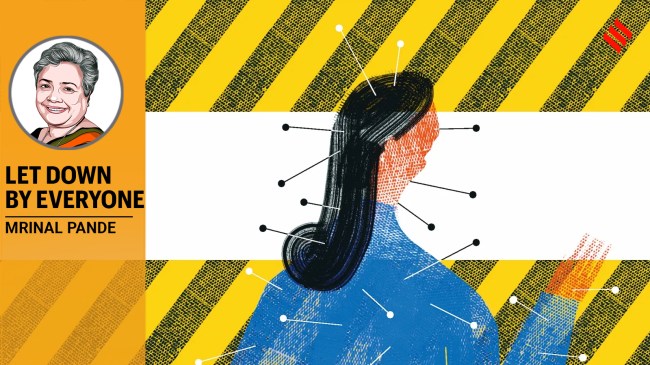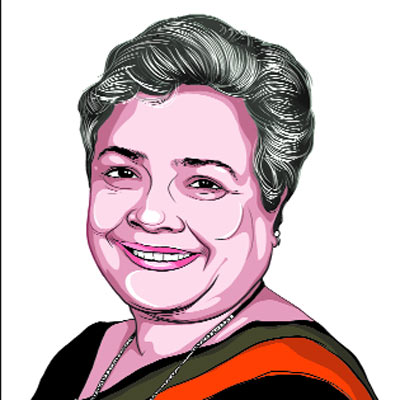Opinion Nikki Bhati death: Who silences the dowry victim?
Patriarchy, caste and class norms
 We haven’t heard of a debate over the need to invoke anti-dowry laws in Nikki’s case. The alleged perpetrators belong to the same community and their arrest could dishonour them all, ran the unspoken logic.
We haven’t heard of a debate over the need to invoke anti-dowry laws in Nikki’s case. The alleged perpetrators belong to the same community and their arrest could dishonour them all, ran the unspoken logic. We have a plenitude of laws, but not enough justice. In the edifice that citizens helped to build in the year 1947, the cracks are now showing.” Thus said Fali Nariman, one of our finest legal minds.
Recent incidents of young women being tortured and killed, allegedly over dowry demands, point to these cracks in the system. Our anti-dowry laws date back to 1961 — they were sharpened in 1983 to combat dowry-related violence, and heavy penalties were imposed if the crime was proven in court. But women remain subject to the dynamics of caste- and gender-related prejudices. The values and prejudices that sustain female foeticide and infanticide also empower those who demand dowry.
These prejudices may have no life of their own. Yet, when supported silently by institutions and powerful lobbies, they can lead to cases like the alleged murder of Nikki Bhati, a 28-year-old mother of one, by her husband and his family. According to the FIR filed by Nikki’s family, even after receiving a substantial dowry, her husband and in-laws continued torturing her, to pressure her family to give more cash, gold and another car.
The truth isn’t out in the Nikki Bhati case, and there is more than one story doing the rounds about her death. But as in most dowry deaths, marital rape or spouse and child abuse cases, we see the complex workings of three factors: Patriarchy, class and caste. According to reports, soon after a mahapanchayat was called in Baghpat, the head of the All India Kshatriya Mahasabha proposed a mind-boggling way to “protect” young Thakur women. Why shouldn’t brides be gifted guns and swords instead of ornaments as dowry, he asked? They shall enter their marital home armed to protect themselves against torture.
According to reports, whenever Nikki was tortured beyond tolerance levels, she did not approach the police, but went to her natal home for protection. The patriarch, too, doesn’t go to the police. He calls for a caste panchayat, which votes in favour of a reconciliation based on promises obtained from the husband’s family. The abused wife is sent back. We haven’t heard of a debate over the need to invoke anti-dowry laws in Nikki’s case. The alleged perpetrators belong to the same community and their arrest could dishonour them all, ran the unspoken logic. The panchayat, reportedly, even asked her and her family to think of family and caste honour and adjust.
The (all-male) caste panchayats are generally critical of “love marriages”. Here was a duly arranged match along caste and gotra lines, where a good dowry was given, so they must have blessed this marriage. But when it comes to reforming tradition, all that the head of the mahapanchayat could come up with was that brides be sent armed to their marital homes.
A glance at social media posts reveals that the same ideology is pervasive among caste groups. Netizens, raised on a steady diet of politically weaponised patriarchal view of Hindu or Islamic scriptures, are quick to let loose a horrific wave of misogyny, blaming the victim, with the familiar whataboutery of “Don’t men suffer bad marriages, too?”
Click on #JusticeForNikki to see how many are now dubbing it a suicide, leaning on CCTV footage from a shop across the street that shows the alleged perpetrator outside with his son (who gave eyewitness testimony to the police) while Nikki was burning inside. No one is asking for footage from inside the sisters’ home-run beauty parlour. Instead, the other sister is being called out for not approaching the Mahila Police cell. A hashtag #justiceforvipin has also surfaced, alleging how nobody bothers about a man’s life, how “these are false narratives” set by the media.
The fact is that those with power in society continue to design social norms and institutions. While framing or revising laws, these become the highest standards. Inequality is difficult to spot if the family, caste panchayats, police and law all tell the powerless that status quo means equality. Do not ask the ironsmith how steel tastes, said the poet Dhoomil, ask the horse who holds the bit in the mouth.
The writer is former chairperson, Prasar Bharati






